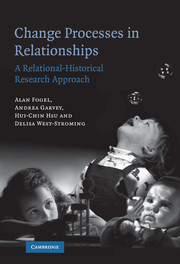Book contents
- Frontmatter
- Contents
- List of figures
- List of tables
- Acknowledgments
- Prologue Overview of the research problem and summary of findings
- 1 Relationships as developing systems: theoretical foundations
- 2 Mother-infant relationship development in the first six months: from face-to-face play to object play
- 3 Relational-historical research on developmental change
- 4 Relational-historical research: the multiple case study approach, frame analysis, qualitative and quantitative analysis
- 5 Research propositions about relationship change processes
- 6 Research methods for the current investigation: subjects, procedures, and data analysis
- 7 Results of the current investigation: quantitative analysis of developmental changes in relationship frames and in infant actions
- 8 Results of the current investigation: qualitative analysis of Richard and his mother
- 9 Results of the current investigation: qualitative analysis of Betsy and her mother
- 10 Results of the current investigation: qualitative analysis of Lewis and his mother
- 11 Results of the current investigation: qualitative analysis of Susan and her mother
- 12 Summary of findings on relational-historical change
- Epilogue Laws of change: implications for theory and practice
- References
- Author index
- Subject index
1 - Relationships as developing systems: theoretical foundations
Published online by Cambridge University Press: 22 September 2009
- Frontmatter
- Contents
- List of figures
- List of tables
- Acknowledgments
- Prologue Overview of the research problem and summary of findings
- 1 Relationships as developing systems: theoretical foundations
- 2 Mother-infant relationship development in the first six months: from face-to-face play to object play
- 3 Relational-historical research on developmental change
- 4 Relational-historical research: the multiple case study approach, frame analysis, qualitative and quantitative analysis
- 5 Research propositions about relationship change processes
- 6 Research methods for the current investigation: subjects, procedures, and data analysis
- 7 Results of the current investigation: quantitative analysis of developmental changes in relationship frames and in infant actions
- 8 Results of the current investigation: qualitative analysis of Richard and his mother
- 9 Results of the current investigation: qualitative analysis of Betsy and her mother
- 10 Results of the current investigation: qualitative analysis of Lewis and his mother
- 11 Results of the current investigation: qualitative analysis of Susan and her mother
- 12 Summary of findings on relational-historical change
- Epilogue Laws of change: implications for theory and practice
- References
- Author index
- Subject index
Summary
In this introductory chapter, we begin with an overview of our basic theoretical orientation toward relationships. Relationships are not simply a thing to be studied and understood. Rather, we view all of nature as a system of interconnected relationships. In that sense, everything is part of a nexus of relationships: there are no “individuals” but only persons-in-relation. Second, we review a group of developmental theories that have their foundation in this relational world-view.
Overview of the theoretical orientation
A relational perspective on development
The foundational principle of this book is that people develop in relation to others and to their environments. A full grasp of a relational perspective must involve each person in their local relationships (family, work, school) and in relation to the sociocultural system. Here, however, we take a relatively simple relationship system – mother and child – and use it as a model system for revealing some of the details of how all relationships change over time. In the Epilogue, we shall elaborate ways in which our findings can be generalized to other relationships but the reader is encouraged to explore their own implications throughout the book.
People are not “themselves” in isolation but become fully realized as whole human beings in relation to others (Beebe & Lachman, 2002; Collins, 1999; Fogel, 1993; Hinde & Stevenson-Hinde, 1987; Lyra & Winegar, 1997; Overton, 2002; Sander, 1977; Stern, 1985; Tronick, 1998).
Information
- Type
- Chapter
- Information
- Change Processes in RelationshipsA Relational-Historical Research Approach, pp. 14 - 34Publisher: Cambridge University PressPrint publication year: 2006
